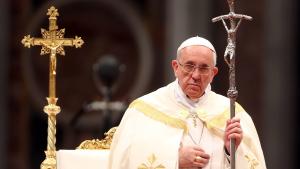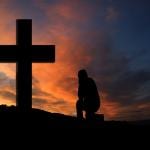
St. Augustine, writing against the Manichaeans, explained how heretics often wanted to identify themselves as Catholics, but yet no one, not even the heretics themselves, would point to their chapel when a stranger asked them where Catholics meet:
The succession of priests keeps me, beginning from the very seat of the Apostle Peter, to whom the Lord, after His resurrection, gave it in charge to feed His sheep, down to the present episcopate. And so, lastly, does the name itself of Catholic, which, not without reason, amid so many heresies, the Church has thus retained; so that, though all heretics wish to be called Catholics, yet when a stranger asks where the Catholic Church meets, no heretic will venture to point to his own chapel or house. Such then in number and importance are the precious ties belonging to the Christian name which keep a believer in the Catholic Church, as it is right they should, though from the slowness of our understanding, or the small attainment of our life, the truth may not yet fully disclose itself.[1]
St. Augustine gave a simple way by which the Catholic faith could be discerned: it was Catholic, it was universal, and even those who were not Catholics knew exactly what was being asked if and when someone asked where one was to go to be with the Catholics. It was with that chapel or house which found itself in union with the succession of priests centered around the Seat of Peter. While schismatics might try to point to their parishes, while some heretics now might even point to their parishes when asked today, the world at large will answer according to St. Augustine’s dictates: an ordinary person would point to a Catholic parish, not some schismatic parish, when asked where one should go to meet with the Catholics.
Similarly, if someone asked, who is the Pope, certainly many heretical or schismatic groups might have established some anti-Pope which they follow, but no ordinary person would ever point to that anti-Pope as Pope. The world over, Catholics, Orthodox, Protestants, and non-Christians alike can point out the proper and official Pope (Pope Francis). Those who would like their anti-Pope to be recognized, or those who would like to think there is no legitimate Pope, would find that their position is rejected. Following the logic of St. Augustine against the Manichaeans, they would have no standing. The world knows who are the Catholics, and the world knows who is the Pope. This should not be surprising because God does not want to hide the light of the faith under a bushel: if the true Catholic faith, or the true Pope, was someone not easily known and recognized by the world at large, then God would make it near impossible for someone to find the Catholic faith itself.[2]
This is why those who think that Pope Francis is a heretic, and has automatically been removed from office, are insane. Likewise, those who try to call him a heretic, using the most absurd reasons (such as saying he showed himself to being a Satanist with a stang) to justify his removal from office should be held up to ridicule as well. Canon Law of the Latin Rite deals harshly with those who would abuse the Pope in this manner:
Can. 1372 A person who makes recourse against an act of the Roman Pontiff to an ecumenical council or the college of bishops is to be punished with a censure.
Can. 1373 A person who publicly incites among subjects animosities or hatred against the Apostolic See or an ordinary because of some act of power or ecclesiastical ministry or provokes subjects to disobey them is to be punished by an interdict or other just penalties.
Can. 1374 A person who joins an association which plots against the Church is to be punished with a just penalty; however, a person who promotes or directs an association of this kind is to be punished with an interdict.[3]
Just penalties, which can include an interdict, are to be given to those who promote hatred or a plot against the Pope of Rome. The Open Letter Against Pope Francis can easily be seen as falling under these Canons. Those who wrote it, those who signed it, those who promote it, all risk their status. It should not be surprising if someone associated with a Pontifical University who signed would find themselves receiving a just penalty for their abuse against the Pope. Those who attack the Vatican’s response to those who signed the letter risk facing similar penalties as well: there are consequences for open defiance against the Pope (which is not the same thing as an intellectual disagreement with him; scholars can ask questions, demonstrate their concerns, but when they go beyond opinions and start dictating to the Pope, trying to have him removed from office because of their difference of opinion, they go from scholarship to activism, and the kind of activism which has penalties associated with it).
Despite while Philip Lawler suggests, the Vatican has a history of removing theologians from teaching positions due to what it thought ran contrary to the mission of the Church.[4] Perhaps, in recent times, the most famous instance of this was with Charles Curran. Despite the particular instances of each case, most of them offered differing opinions, and did not suggest the Pope was a heretic to be kicked out of office. If difference of opinion was enough to justify removing theologians from teaching positions, clearly actively promoting a rejection of the Pope and trying to have a coup take him out of office justifies the Vatican’s responses with those making outrageous, erroneous assertions about the Pope.
Pope Francis has taken the accusations in stride. He laughs at how ridiculous the charges are, but also prays for those who make them. He knows he is under attack by rigorists who follow the letter of the law but not the spirit. They look to the dead past without understanding, which is why they fail to see the movement of tradition and how it all relates to one whole, to a church guided by the Holy Spirit to meet with the needs of the faithful today instead of those of the past. Tradition, like Scripture, needs to be properly interpreted; fundamentalistic thinking ignores the hermeneutic process as it reduces the teachings and practices of the church to a dead letter.
Francis is the Pope of Rome. Catholics know this. Orthodox know this. Protestants know this. Muslims know this. Hindus know this. Buddhists know this. Atheists know this. The world knows this. There is no secret way for him to be removed from office. Conspiracy theories and outrageous theological interpretations cannot remove him from office. Those who would promote them must understand what they risk. They have been warned.
[1] St. Augustine, “Against the Epistle of Manichaeus called Fundamental” in NPNF1(4): 130.
[2] To find the Catholic faith in such circumstances would require some sort of esoteric Gnosis, the kind which St. Irenaeus contended against in his Against Heresies.
[3] Codex Iuris Canonici. Vatican translation.
[4] Also, despite what Lawler suggested, many conservatives have indeed worked hard to get those they view as liberal out of a job, sometimes with success, sometimes with partial success, and of course, often with failure. The notion that conservatives are some passive martyrs who harm no one is absurd.
Stay in touch! Like A Little Bit of Nothing on Facebook.
If you have liked what you read, please consider sharing it with your friends and family!













